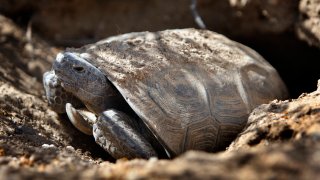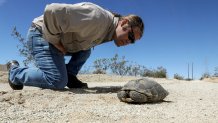
Building on a 20-year tortoise relocation effort by the U.S. Fish and Wildlife Service, UCLA researchers have found that individual genetic variation was the key to a transplanted species' survival, in research published Friday in the peer-reviewed journal Science.
The study upends the conventional wisdom that a transplant's success improves if it comes from a nearby habitat, as the data showed no connection between geography and survival.
"It flies in the face of what we know from other translocation studies, but lots of genetic variation was hands-down the best predictor of whether a tortoise lived or died," said UCLA professor Brad Shaffer, a conservation ecologist and senior author of the study.

Climate change increasingly makes relocating threatened species necessary, despite the tactic's frequently low success rate. UCLA's research offers a fast, inexpensive new conservation tool to increase survival rates when moving endangered plants and animals.
The researchers sequenced the DNA of Mojave desert tortoises that were relocated around the same time period. They found that survivors averaged 23% greater genetic variation, or heterozygosity, than those that perished.
From 1997-2014, U.S. Fish and Wildlife translocated approximately 9,100 threatened Mojave desert tortoises that were abandoned as pets or pushed out by development. They were relocated to a 100-square kilometer site in Ivanpah Valley, southeast of Las Vegas. The threatened species, native to the southwestern U.S. and northwestern Mexico, is under consideration for endangered status in California.

